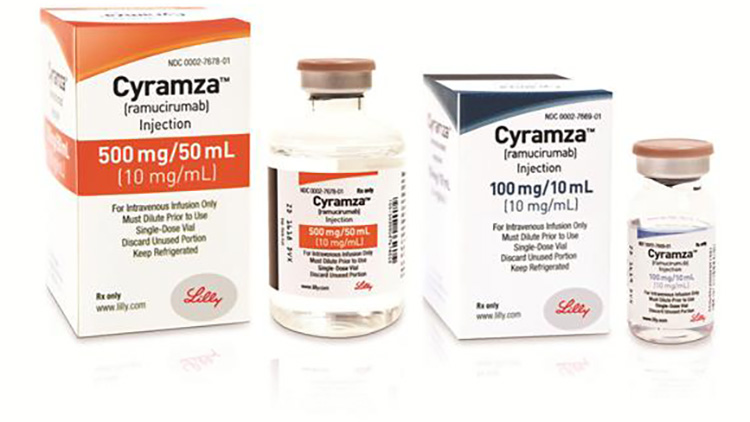Keytruda (pembrolizumab) vs Cyramza (ramucirumab)
Keytruda (pembrolizumab) vs Cyramza (ramucirumab)
Keytruda (pembrolizumab) is an immune checkpoint inhibitor that works by blocking the PD-1 protein on immune cells, thereby boosting the immune system's ability to detect and fight cancer cells, and is commonly used in various types of cancers including melanoma, lung, and head and neck cancers. Cyramza (ramucirumab), on the other hand, is a vascular endothelial growth factor (VEGF) Receptor 2 antagonist, which works by inhibiting the blood supply to tumors, and is typically used for gastric cancer, colorectal cancer, and non-small cell lung cancer. The choice between Keytruda and Cyramza would depend on the specific type of cancer, its molecular characteristics, the patient's overall health status, and the treatment plan recommended by the oncologist.
Difference between Keytruda and Cyramza
| Metric | Keytruda (pembrolizumab) | Cyramza (ramucirumab) |
|---|---|---|
| Generic name | Pembrolizumab | Ramucirumab |
| Indications | Various types of cancers including melanoma, lung cancer, head and neck cancer, Hodgkin lymphoma, and others | Gastric cancer, non-small cell lung cancer, colorectal cancer, and hepatocellular carcinoma |
| Mechanism of action | Programmed death receptor-1 (PD-1) blocking antibody | Vascular endothelial growth factor receptor 2 (VEGFR2) antagonist |
| Brand names | Keytruda | Cyramza |
| Administrative route | Intravenous infusion | Intravenous infusion |
| Side effects | Fatigue, musculoskeletal pain, decreased appetite, pruritus, diarrhea, nausea, rash, fever, cough, dyspnea, constipation, pain, and abdominal pain | Hypertension, diarrhea, headache, hyponatremia, and increased risk of bleeding |
| Contraindications | Severe hypersensitivity to pembrolizumab or any of its excipients | Severe hypersensitivity to ramucirumab or any of its excipients |
| Drug class | Anti-PD-1 monoclonal antibody | Anti-VEGFR2 monoclonal antibody |
| Manufacturer | Merck & Co. | Eli Lilly and Company |
Efficacy
Keytruda (Pembrolizumab) Efficacy in Lung Cancer
Keytruda, also known by its generic name pembrolizumab, is a highly effective treatment option for certain types of lung cancer. It is a type of immunotherapy that works by blocking the PD-1 pathway, which some cancer cells use to hide from the immune system. By inhibiting this pathway, Keytruda helps the immune system to detect and fight cancer cells. It has been approved for the treatment of patients with metastatic non-small cell lung cancer (NSCLC) whose tumors express PD-L1 and who have previously failed other treatments. In clinical trials, Keytruda has shown to improve survival rates compared to chemotherapy alone. The efficacy of Keytruda can vary based on the level of PD-L1 expression and whether it is used as a first-line treatment or in combination with other therapies.
Cyramza (Ramucirumab) Efficacy in Lung Cancer
Cyramza, with the generic name ramucirumab, is another medication used in the treatment of lung cancer, specifically non-small cell lung cancer (NSCLC). It is a vascular endothelial growth factor receptor 2 antagonist, which means it works by inhibiting the blood supply that tumors need to grow. Cyramza is typically used in combination with chemotherapy after other treatments have failed. In clinical studies, Cyramza has been shown to improve progression-free survival in patients with advanced NSCLC when added to first-line chemotherapy. Its effectiveness has been particularly noted in patients with certain types of NSCLC, such as those with adenocarcinoma histology.
Combination Therapies and Varied Responses
Both Keytruda and Cyramza have been studied in combination with other cancer treatments. Keytruda, for instance, has been evaluated in combination with chemotherapy and has shown to improve outcomes in some patient populations with advanced or metastatic NSCLC. Cyramza, when used with erlotinib, has also demonstrated efficacy in treating NSCLC, particularly in patients with EGFR mutations. The response to these treatments can be influenced by a variety of factors, including the genetic makeup of the tumor, the stage of the cancer, and the overall health of the patient.
Considerations for Treatment
When considering the efficacy of Keytruda and Cyramza for lung cancer, it is important to take into account the specific characteristics of the patient and the cancer. Both drugs have been approved by regulatory agencies based on data from clinical trials, but individual responses can vary. Oncologists will typically select a treatment regimen based on the patient's type of lung cancer, prior treatments, and overall health status, as well as the presence of specific biomarkers that may predict a better response to these drugs. It is also crucial to consider potential side effects and the patient's quality of life when evaluating these treatment options.
Regulatory Agency Approvals
Keytruda
-
European Medical Agency (EMA), European Union

-
Food and Drug Administration (FDA), USA

-
Health Canada

-
Therapeutic Goods Administration (TGA), Australia

-
Medsafe (NZ)

Cyramza
-
European Medical Agency (EMA), European Union

-
Food and Drug Administration (FDA), USA

-
Health Canada

-
Therapeutic Goods Administration (TGA), Australia

-
Medsafe (NZ)

Access Keytruda or Cyramza today
If Keytruda or Cyramza are not approved or available in your country (e.g. due to supply issues), you can access them via Everyone.org.
How it works

Make an enquiry
Choose the medicine you want to buy, answer a couple of questions, and upload your prescription to speed things up. We’ll get back to you within 24 hours.


Make an enquiry
Choose the medicine you want to buy, answer a couple of questions, and upload your prescription to speed things up. We’ll get back to you within 24 hours.


Breeze through the paperwork
We'll guide you through the required documents for importing unapproved medicine, ensuring you have all the necessary information.


Get a personalized quote
We’ll prepare a quote for you, including medicine costs and any shipping, administrative, or import fees that may apply.


Receive your medicine
Accept the quote and we’ll handle the rest - sourcing and safely delivering your medicine.

Some text on this page has been automatically generated. Speak to your physician before you start a new treatment or medication.
Let's talk
If you have any questions, call us or send us a message through WhatsApp or email:
Contact us




